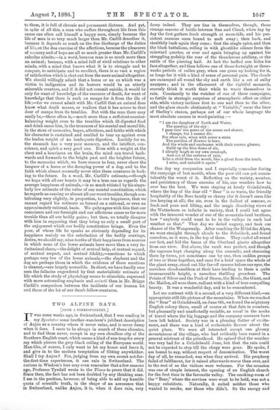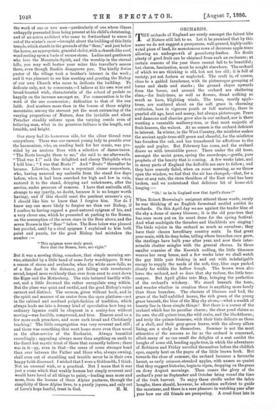TWO ALPINE DAYS.
[FROM A CORRESPONDENT.]
IT was some weeks ago, in Switzerland, that I was reading in my Spectator some brother- wanderer's jubilant description of Anjou as a country where it never rains, and is never damp when it does. I seem to be always in search of these climates, and to find them never, except in my own cloudless city of the Southern English coast, which seems a kind of sun-trap for every ray which pierces the grey-black ceiling of the European world. Man-like, of course, I only want to let my house and leave it, and give in to the modern temptation of flitting anywhither. Shall I try Anjou P For, judging from my own recent not-for- the-first-time experiences, it can rain in Switzerland. The carious in Wisdom's lore may even remember that a few seasons ago, Professor Tyndall wrote to the Times to prove that it did. Since then, the fact has not been doubted by any thinking man. I am in the position, however, of being able to add my humble quota of scientific truth, in the shape of an assurance that in Switzerland, unlike Anjou, it is, when it does rain, very
damp indeed. They are fine in themselves, though, those strange seasons of battle between Sun and Cloud, when day by day the first gathers fresh strength at noon-tide, and his per- sistent enemies seem bound to melt away ; then back, and stealthily back again they come ; first the single spies, and then
the black battalions, rolling in with ghostlike silence from the rainward quarter, or ever and again bringing up against his struggling godship the roar of the thunderous artillery, or the rattle of the piercing hail. At last the baffled sun hides his face altogether, and then follows one of those fortnight or three- weeks periods of sullen grey, when one gives up looking for it, or longs for it with a kind of sense of personal pain. The clouds are encamped all round the sky and earth like a set of sulky
usurpers ; and in the effacement of the rightful monarch, scarcely think it worth their while to waste themselves in rain. Constantly to the watcher of one of these campaigns, so fertile in strategic surprises of atmospheric effect on either side, while victory inclines first to one and then to the other, and the glass stands obstinately at "Variable," recur the lines of Shelley's stanza, perhaps out of our whole language the most absolute success in word-painting :—
" I am the daughter of Earth and Water,
The nursling of the sky : I pass thro' the pores of the ocean and shores, I change, but I cannot die.
For after rain, when with never a stain The pavilion of Heaven is bare, And the winds and sunbeams, with their convex gleams, Build up the blue dome of air, I silently laugh at my own cenotaph, And out of the caverns of rain, Like a child from the womb, like a ghost from the tomb, I arise, and unlmild it again."
One day my companion and I especially remember during the campaign of last month, when the poor old sun got unmis- takeably the worst of it. Reflecting on the variety, number, and persistency of those enemies of his, one wonders how he ever has the best. We were staying at lovely Grindelwald, where the hug of the dear old " Bear " is so warm, the friendly hospitality of the Boss family so cheery (for it doesn't seem like inn-keeping at all), the air, even in the dullest of seasons, so fresh and pure and lifting, and the magic dissolving views of the Wetterhorn so infinite in variety, that I could but agree with the innocent wonder of one of the mountain-bred brothers, how "anybody could want to be in the valleys in such bad
weather as that." That day we defied augury, and took our chance of the Wengernalp. After reaching the Intel des Alpes, we went straight through clouds to the Scheideck, and found ourselves, as it were, in the top of them. They curled all round our feet, and hid the bases of the Oberland giants altogether from our view. But above, the vault was perfect, and though the vapours kept charging along the summits, and obscuring them by turns, yet sometimes one by one, then sudden groups of two or three together, and once for a brief space the whole of the giant array, stood out like far-off cameos before our eyes, the moveless cloud-cauldron at their base lending to them a quite immeasurable height, a nameless thrilling grandeur. The Points of Silver and the Peak of Storm, the Monk, the Giant, and
the Maiden, all were there, radiant with a kind of tear-compelling beauty. It was a wonderful day, and to be remembered.
Let me contrast with it a second, of a very different kind,—an appropriate still-life picture of the mountains. When we reached the "Bear" at Grindelwald, on June 8th, we found the migratory English colony there, small of course at that date in numbers, but pleasantly and unaffectedly sociable, as usual in the nooks of travel where the big luggage and the company manners have been left behind. Society was in a pleasing flutter of excite- ment, and there was a kind of ecclesiastic flavour about the quiet place. We were all interested except one gloomy mountaineer of the village, who had evidently been reared in a general mistrust of the priesthood. He opined that the weather was very bad for a Grindelwald June, but that the rain could not be expected to stop till the clergy were gone. He spoke, I am bound to say, without respect of denomination. The worst day of all, he remarked, was when they arrived. His prophecy failed of fulfilment, for it rained afterwards worse than ever, and to the rest of us the visitors were welcome. For the occasion was one of simple interest, the opening of an English church
for the first time in the favourite valley. The smoking-room of the "Bear," where the services were wont to be held, was not a happy substitute. Naturally, it suited neither those who wanted to smoke, nor those who didn't. So the energy and the work of one or two men—particularly of one whom illness unhappily prevented from being present at his child's christening, and of an active architect who came to Switzerland to nurse it out of the winter's snow —brought about the building of this little temple, which stands in the grounds of the "Bear," and jest below
the house, an appropriate, graceful chalet, with a church-like roof, wood resting upon a basis of secure stone. Ladies and gentlemen who love the Mountain-Spirit, and the worship in the eternal hills, you may well bestow your mites this traveller's season there, even though Ruskin disapprove you. The kindly Swiss pastor of the village took a brother's interest in the work ; and it was pleasant to see him meeting and greeting the Bishop of our own Church who came to dedicate the building. To dedicate only, not to consecrate,—I believe at his own wise and broad-hearted wish, characteristic of the school of prelate so happily on the increase amongst us. For consecration is to the work of the one communion ; dedication to that of the one faith. And nowhere more than in the bosom of those mighty mountains, among the sternest yet the most entrancing of the varying proportions of Nature, does the invisible and silent Preacher steadily enforce upon the varying creeds even of believing man, what in its generous fullness is the length, and breadth, and height.
Our story had its humorous side, for the silver thread runs everywhere. There was our earnest young lady to preside over the harmonium, who, on sending back for her music, was pro- vided by an anxious Boss with a selection of dance-tunes. 'The Boots brought them to me," she said to me afterwards. 'That was I !" said the delighted and cheery Th4ophile when I told him ; "I was that Boots !" And " Bootz " thereafter he became. Likewise, there was a repentant sinner somewhere, who, having annexed my umbrella from the stand five days before, when it had been searched for high and low in vain, restored it to the stand, dripping and unbeknown, after the service, under pressure of remorse. I have that umbrella still, strange to say (partly, no doubt, because it is no longer worth having), and if this should meet the penitent annexer's eye, I should like him to know that I forgive him. Nor do I know any one more likely to forgive me than our Bishop, if I confess to having capped a good-natured epigram of his, and a very clever one, which he presented at parting to the Bosses, on the assumption of the seven stars in the Bear above, and the seven Bosses in the "Bear" below. The Boss below was pleased but puzzled, until by a rival epigram I explained to him both point and puzzle, for the good Bishop had mistaken the number :—
"This epigram were truly great, Save that the Bosses, here, are eight."
But it was a moving thing, somehow, that simple morning ser- vice, attended by a little band of some forty worshippers. It was a season of storm and avalanche, when the white snow-falls, as of a fine dust in the distance, yet falling with reverberate sound, leaped more recklessly than ever from crest to crest down the Eiger and the Mettenberg. The rain battered hardily with- out, and a little drowned the rather unregulate song within. But the place was quiet and restful, and the good Bishop's voice earnest and distinct. The sermon, given without book, and in the spirit and manner of an orator from the open platform—not in the cabined and confined pulpit-fashion of tradition, which always leads me into a dreamy kind of speculation how long an ordinary layman could be eloquent in a sentry-box without moving—was forcible, compressed, and true. Heaven send us a few more such preachers, and more such broad and Christianly teaching ! The little congregation was very reverent and still ; and there was something that went home more even than usual in the after-service of the Eucharist. Always beautiful exceedingly ; appealing always more than anything on earth to the direct but mystic trust of those that earnestly believe ; there was in it—ay, even in that—the sense of some stronger bond than ever between the Father and those who, always owning, shall even out of stumbling and trouble never be in their own happy faith disowned. I wished that I were a Goldsmith, I think. Not an unusual wish, or a practical. But I mean that it was just a scene which that weakly human but simply reverent soul would have loved of all things to paint,—leading man more and more, from the lessons of those Alpine pastures, through the simplicity of those Alpine lives, to a purely joyous, and only out
of Love's hope fearful, trust in God. H. M.



































 Previous page
Previous page